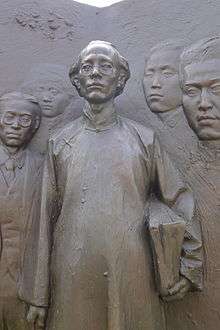Rou Shi
| Rou Shi | |
|---|---|
|
| |
| Born |
Zhao Pingfu (赵平复) 28 September 1902 Ninghai County, Zhejiang, China |
| Died |
7 February 1931 (aged 28) Longhua, Shanghai |
| Occupation | Writer |
| Notable works |
February A Slave Mother |

Rou Shi (Chinese: 柔石; 28 September 1902-7 February 1931), formerly romanized as Jou Shih, was a prominent left-wing Chinese writer and member of the May Fourth Movement.[1] Executed in February 1931 by the Kuomintang government in Shanghai for his pro-Communist activities, he is considered one of the Five Martyrs of the League of Left-Wing Writers.[2]
Early life and career
Rou Shi was born Zhao Pingfu (赵平复) on 28 September 1902 in Ninghai County, Zhejiang province. In 1918 he entered Hangzhou No. 1 Normal School in the provincial capital Hangzhou. After graduating in 1923, he became a teacher at Pudi Elementary School in Cixi, Zhejiang. In 1925 he published his first collection of short stories, Mad Man.[3]
In 1925 Rou Shi studied briefly at Peking University, but returned to Zhejiang in the spring of 1926, teaching in Hangzhou and Zhenhai. In the summer of 1927 he returned to his hometown Ninghai and taught at Ninghai High School, a local Communist base. After the failed Communist rebellion in May 1928, he took refuge in Shanghai, where he was introduced to the leading leftist writer Lu Xun. Together with Lu Xun and others, he cofounded the Morning Flower Society (朝花社), which published several progressive journals.[4] In January 1929 he succeeded Lu Xun as the editor of the journal Yu Si (语丝). During this period he wrote the novel February and another collection of short stories entitled Hope (希望). He also translated works by foreign writers such as Maxim Gorky.[4]
In March 1930, the League of Left-Wing Writers was established in Shanghai.[4] Rou Shi attended its inaugural meeting, and became an executive and standing committee member in charge of the League publication Meng Ya (萌芽).[2][4] He joined the Communist Party of China in May 1930, and published the short story, A Slave Mother (为奴隶的母亲).[4]
Arrest and execution
On 17 January 1931, while attending a secret Communist Party meeting at the Oriental Hotel in the British concession of Shanghai, Rou Shi was arrested along with other attendees by the British police. They were handed over to the Kuomintang government and held in prison for three weeks.[2]
On 7 February 1931, the Kuomintang executed 23 Communists in Longhua, Shanghai. The five members of the Left League executed on that day, Rou Shi, Li Weisen, Hu Yepin, Yin Fu, and Feng Keng, are called the Five Martyrs of the League of Left-Wing Writers by the Communist Party.[2] Among the executed were three women, one pregnant.[2] They were executed either by gunshot or by being buried alive. According to Frank Moraes, Rou Shi was in the latter group,[5] but an article on Xinhua says he was killed by gunshots.[4]
Works and adaptations
One of Rou Shi's best known short stories, A Slave Mother, was first translated to English by Edgar Snow in 1936.[6] In 1963, his novel February was adapted to the critically acclaimed film Early Spring in February, which was directed by Xie Tieli and starred Sun Daolin, Shangguan Yunzhu, and Xie Fang.[7][8] In 2003, A Slave Mother was adapted to a television film starring He Lin (何琳), who won the Best Actress award of the 2005 International Emmy Award for her performance in the film.[9]
Memorials
On the 100th anniversary of his birth in 2002, Rou Shi's hometown Ninghai restored his former residence and opened it as a museum in his memory. In addition, the county opened the newly built Rou Shi Park covering an area of 250 mu.[10]
References
- ↑ Johnson 1985, p. 29.
- 1 2 3 4 5 Wong 1991, p. 100.
- ↑ 柔石 [Rou Shi] (in Chinese). China Writers' Association. Retrieved 16 November 2013.
- 1 2 3 4 5 6 柔石 [Rou Shi] (in Chinese). Xinhua. Retrieved 16 November 2013.
- ↑ Moraes 1953, p. 32.
- ↑ Hamilton 2003, p. 52.
- ↑ 新中国成立六十周年优秀电影-《早春二月》 [Early Spring in February] (in Chinese). Sina. Retrieved 16 November 2013.
- ↑ Ye 2012, p. 189.
- ↑ "Chinese actress wins Emmy award". People's Daily. 23 November 2005. Retrieved 16 April 2014.
- ↑ 左联五烈士之一遗迹:柔石故居和柔石公园 [Rou Shi residence and Rou Shi Park] (in Chinese). Ninghai News. Retrieved 24 November 2013.
Bibliography
- Hamilton, John Maxwell (2003). Edgar Snow: A Biography. Louisiana State University Press. ISBN 978-0807129128.
- Johnson, Kay Ann (1985). Women, the Family, and Peasant Revolution in China. University of Chicago Press. ISBN 978-0226401898.
- Moraes, Frank (1953). Report on Mao's China. MacMillan. ASIN B000L312QC.
- Wong, Lawrence Wang-Chi (1991). Politics and Literature in Shanghai: The Chinese League of Left-Wing Writers. Manchester University Press. ISBN 0-7190-2924-4.
- Ye, Tan; Yun Zhu (2012). Historical Dictionary of Chinese Cinema. Scarecrow Press. ISBN 978-0810867796.